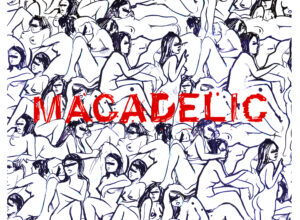Released: 2018
“Come Back to Earth” by Mac Miller is a haunting look into the rapper’s struggles with mental health, depicting his desire for escape and his yearning for connection. It’s a track that vibrates with vulnerability as Miller reflects on his regrets, his loneliness and his search for relief. This is the raw truth of his existence, unvarnished and unabashed – an intimate portrait of a man grappling with his inner demons.
The hook hits you first: “My regrets look just like texts I shouldn’t send / And I got neighbors, they’re more like strangers / We could be friends / I just need a way out / Of my head / I’ll do anything for a way out / Of my head.” Mac’s talking about his regrets in a modern, relatable way. His regrets, much like unwise texts, are moments he’d prefer to forget. He acknowledges his isolation, even when surrounded by others, and expresses his desperate need for mental liberation. The repetition emphasizes his intense longing for escape from his turbulent thoughts.
Miller then dives into the first verse: “In my own way, this feel like livin’ / Some alternate reality / And I was drownin’, but now I’m swimmin’ / Through stressful waters to relief.” Here, he’s painting a picture of his reality that’s distorted by his mental state, feeling like he’s existing in an alternate reality. He reveals his ongoing battle with his mental health, after being drowning in his depressive state, he’s now trying to swim to safety – looking for some sort of relief.

The next lines read, “Oh, the things I’d do / To spend a little time in Hell / And what I won’t tell you / I’ll prolly never even tell myself.” Is Miller suggesting he’d endure anything, even Hell, to escape his mind? This also implies a sense of self-censorship, hinting that there are things he keeps hidden even from himself. Bella’s high walls of denial and self-protection are clearly present.
He then goes into the chorus: “Don’t you know that sunshine don’t feel right / When you inside all day? / I wish it was nice out, but it look like rain.” Here, Mac Miller speaks to the debilitating nature of his depression which prevents him from enjoying what’s conventionally associated with happiness – sunshine. Despite wishing for better weather, which symbolizes better days and mood, he perceives it as rain, manifesting his inner turmoil.
The lines, “Grey skies are driftin’, not livin’ forever / They told me it only gets better” put a spotlight on the temporal nature of life and emotions. Despite being caught in his gloom, Mac is aware that this won’t last forever – an echo of the common reassurance given to those dealing with mental health struggles that it does get better.
The song then circles back to the hook, reinforcing the recurring themes of longing for escape, regret, and disconnect. The repetition here really hammers home his mental state – his desperate need to escape his thoughts, to connect with those around him, and the weight of regret that hangs over him.
“Come Back to Earth” is the kind of song you feel in your gut. It’s a raw insight into Mac Miller’s struggle with mental health, masterfully crafted with heartfelt lyrics, deep symbolism, and a palpable sense of longing. It speaks to anyone who’s ever felt trapped within their own mind, wrestling with feelings of isolation and a yearning for escape.
The context of this song makes it even more poignant. Released a few short months before his untimely death in September 2018, “Come Back to Earth” serves as a painful reminder of Miller’s internal battles. The fact that he is no longer with us adds a layer of urgency and poignancy to his message, urging us to exercise empathy and understanding towards those dealing with mental health struggles.
Through it all, Mac Miller’s unflinching introspection and unapologetic vulnerability remind us of hip hop’s profound potential to explore difficult themes and spark important conversations. “Come Back to Earth” holds up a mirror not just to Miller’s personal struggles, but to society’s often oversimplified understanding of mental health.








